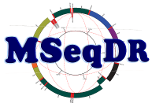Examples Gene: MT-ND1, POLG,
Region: M:1-1000
Variant: m.8993T>G, 1:g.10042757T>C
rs3888511 MSCV_0000006,
ClinVar: RCV000000015,
Disease: Leigh syndrome,
Phenotype: Retinopathy




